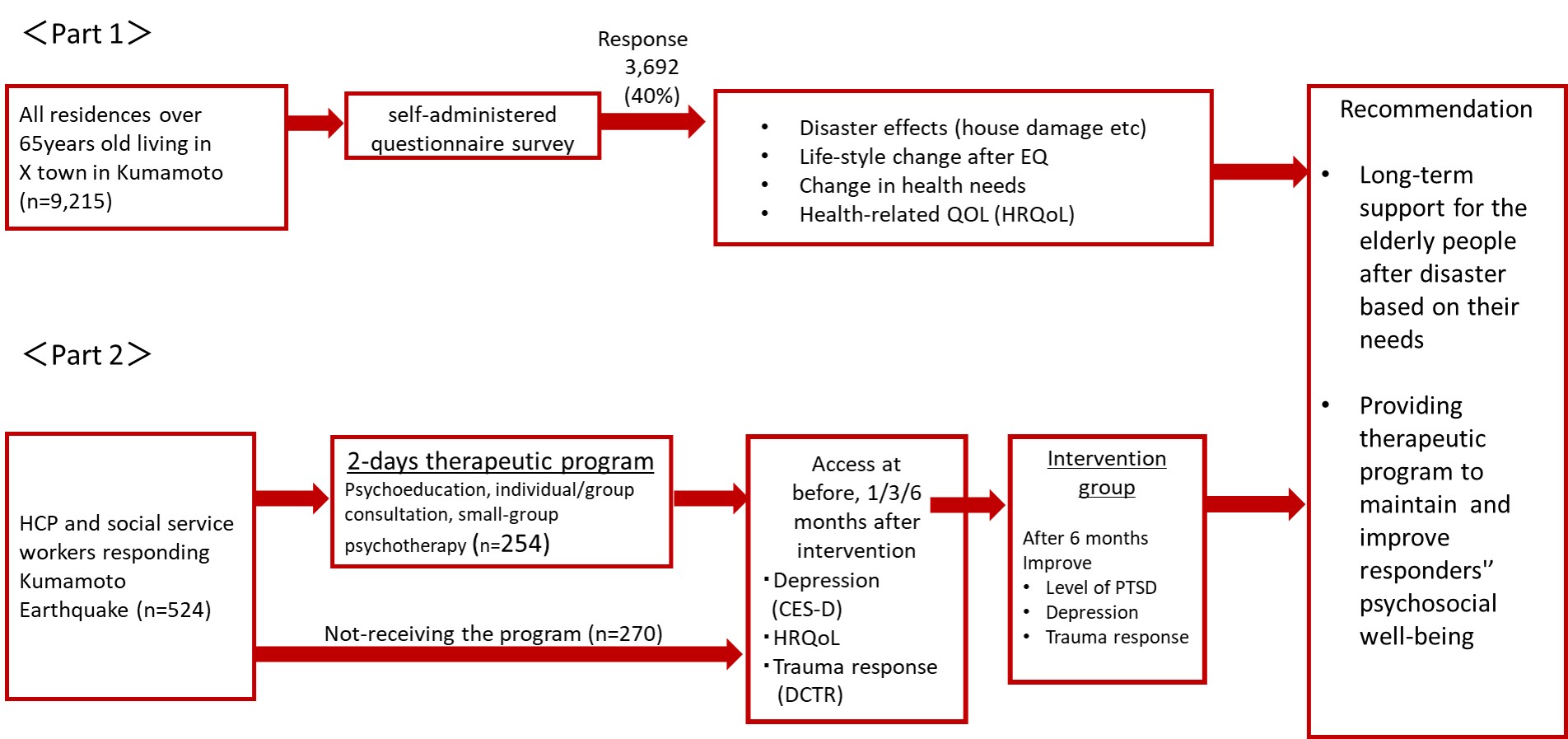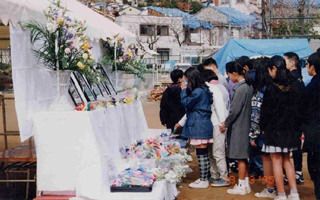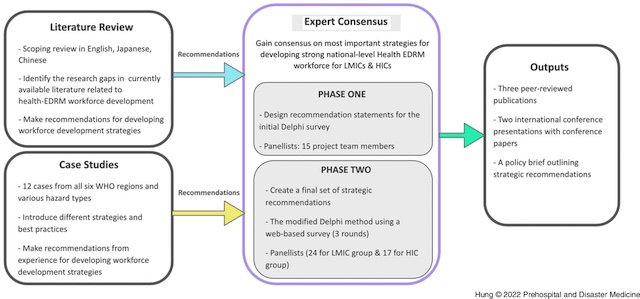Projects for Key Research Themes
WKC convened an expert meeting in 2018 to address the urgent need for Health EDRM research to develop evidence-based policies, programmes and practices. Four research themes were identified to inform effective all-hazards health emergency prevention, preparedness, response and recovery [1].
WKC called for proposals and initiated four research projects in 2019. Furthermore, the 2nd core group meeting in 2020 identified more emerging research needs and two more projects commenced in 2021. These research activities could help countries to strengthen their capacities in emergency risk management and ultimately contribute to one billion more people safe during emergencies [2].
Four Key Research Themes
Area 1: Health data management before, during and after emergencies and disasters
Accurate and comprehensive health data is essential to provide effective health support in disaster relief and recovery. WKC promotes and coordinates research on methodology and tools for health data collection for use before, during and after emergencies and disasters.
| Systematic Review of Health Data Management Before, During and After Emergencies and Disasters |
Area 2: Psychosocial management before, during and after emergencies and disasters
Emergencies and disasters can place significant mental health pressures on those affected, including the responders. Mental health and psychosocial support (MHPSS) is an essential part of Health-EDRM. WKC coordinates research on enhancing health systems for effective MHPSS.
| Determinants of long-term mental health outcomes after disasters and health emergencies: A systematic review and establishment of the Asia Pacific Disaster Mental Health Network |
| Long-term Psychosocial Impact of Natural Disasters on Survivors in Japan |
Area 3: Community disaster risk management including disaster risk literacy and addressing the needs of subpopulations
Inclusivity requires a good understanding of the vulnerabilities and capacities of communities and specific vulnerable sub-populations. How communities perceive and manage risks also greatly affects the health consequence of emergencies and disasters. WKC works on research for better understandings and countermeasures on this research theme.
 |
The Impacts of Climate-related Disasters on Vulnerable Populations in China, Indonesia and Viet Nam: A Scoping Review of Health Adaptation and Implications for Measurement |
 |
Development of Specific Care Strategies to Maintain and Recover Survivors’ Health after Disasters |
Area 4: Health workforce development for health EDRM
Health workforce development is an overarching research theme of Health EDRM. WKC supports research to address this gap and capacity building.
| Health Workforce Development in Health EDRM: Scoping Review, Case Studies and Expert Consultations |
Research themes to address emerging health needs:
Health EDRM in the context of COVID-19
Responding to the emerging Health EDRM research needs in the context of COVID-19, WKC has initiated three research projects since 2020.
| Health EDRM Strategies for strengthening community resilience |
| Changes in Health EDRM Strategies as a result of experience from Covid 19 pandemic |
 |
Developing an algorithm for digital interventions to alleviate mental distress under the COVID-19 pandemic |
[1] Kayano R, Nomura S, Abrahams J, Huda Q, Chan EYY, Murray V. Progress towards the Development of Research Agenda and the Launch of Knowledge Hub: The WHO Thematic Platform for Health Emergency and Disaster Risk Management Research Network (Health EDRM RN). International Journal of Environmental Research and Public Health. 2021; 18(9):4959. https://doi.org/10.3390/ijerph18094959
[2] Kayano R, Nomura S, Abrahams J, Huda Q, Chan EYY, Murray V. Progress towards the Development of Research Agenda and the Launch of Knowledge Hub: The WHO Thematic Platform for Health Emergency and Disaster Risk Management Research Network (Health EDRM RN). International Journal of Environmental Research and Public Health. 2021; 18(9):4959. https://doi.org/10.3390/ijerph18094959
All Archived Research Projects

Development of Specific Care Strategies to Maintain and Recover Survivors’ Health after Disasters
Background
The increasing scale and frequency of disasters has placed a priority on the mitigation of disaster risk and impact. Of special interest is disaster risk management for health, with attention towards vulnerable populations. Older adults are more likely to have physical, cognitive and mental vulnerabilities, such as multiple chronic diseases that can worsen during and after disasters and be complicated by mental health issues such as post-traumatic stress disorder (PTSD) and depression. Healthcare and social service providers affected by disasters are also of concern in terms of the prevention of PTSD and depression, as they are required to keep working under stressful environments.
The current research project was conducted within the context of the 2016 Kumamoto earthquakes that affected over 180,000 people in Japan. It included two studies. The first study aimed to identify the needs and health status of older adults in Town X, one of the most severely damaged areas close to the hypocentre. The second study evaluated the impact of a two-day therapeutic programme among healthcare and social service providers directly affected by the Kumamoto earthquakes. The programme included a psychoeducation intervention, open and individual consultations, and a small-group psychotherapy designed to prevent post-traumatic stress disorder (PTSD) and depression.
Goal
To assess the health status, quality of life, needs for long term care, and changes in lifestyle of people over 65 years affected by the 2016 Kumamoto Earthquakes.
To conduct a therapeutic intervention programme among healthcare and social service providers affected by disasters to evaluate its feasibility, relevance, acceptability and impact on the prevention of PTSD and depression.
Methods
A letter-based questionnaire was sent to all 9,215 citizens over 65 years in Town X three years after the Kumamoto earthquake to collect information about socio-demographic characteristics; disaster effects (e.g. house damage; effect on household finance; requirement of evacuation); lifestyle change after the disaster (e.g. eating habits; daily activities; social activities; and change in health needs before and after the disaster (e.g. long term care, health-related quality of life (HRQoL) as measured with the Short Form (SF)-8.
To evaluate the impact The Centre for Epidemiologic Studies Depression Scale (CES-D); SF-8; and a sheet of dynamic change for trauma response (DCTR)) before, one month, three months, and six months after the intervention.
Results
A total of 3,692 older adults affected by the earthquake (40% of targeted participants) responded to the letter-based survey. Thirty percent of the participants reported a decrease in the frequency of going out and socialization after the earthquake. The need for long term care and support increased three years after the earthquake, and deterioration of the level of needed care and support was observed in 7% of the respondents. Lastly, respondents’ HRQoL scores were lower compared to the national standards: 48.2 versus 49 in males and 46.4 versus 49.3 in females for the physical component score of HRQoL, and 49.3 versus 51.3 in males and 47.6 versus 50.7 in females for the mental health component score of HRQoL.
The therapeutic intervention programme included 254 participants, of which 92.5% were nurses. Between the baseline and 6 months post intervention, the level of PTSD declined from 39% to 19% (p < 0.01), the CES-D average score decreased from 22.8 to 22.3 (p<0.05); and the DCTR average score declined from 8.3 to -2.4 (p<0.01). However, the change in HRQoL was not statistically significant: the average physical component score declined from 43.5 to 41.1 (p >0.05), while the average mental component score was increased from 40.9 to 42.6 (p >0.05).
Implications
Our sample of older adult survivors of the Kumamoto earthquakes displayed lower levels of HRQoL and experienced increased need for care and support three years after the earthquake. The proportion of healthcare and social providers with PTSD was reduced by half following the intervention; however, the lack of a comparable control group limits the assessment of the effectiveness of this therapeutic intervention.


Long-term Psychosocial Impact of Natural Disasters on Survivors in Japan
Over the past few decades, the frequency and severity of natural disasters have increased. Growing population, unplanned urbanization, ageing and related demographic trends have contributed to this change. The 3rd UN World Conference for Disaster Risk Reduction, Sendai Framework for Disaster Risk Reduction 2015-2025 (SFDRR), highlights the fundamental role of health in disaster risk management (DRM) and emphasizes the need for scientific evidence in this area. In practice, the majority of attention to DRM has focused on preparedness and response. However, the long-term psychosocial impact and needs of survivors during the recovery phase have not been well documented nor have there been many studies about possible interventions.
Research Background
In cooperation with NCNP Japan (the institute leading this research), Hyogo Institute for Traumatic Stress and the WHO Kobe Centre Working Group for this project (including 21 Japanese experts) will conduct a comprehensive review of DRM in Japan with a focus on psychosocial interventions.
Research Outline
- Develop a review paper on policy and social innovations for disaster mental health in Japan based on gaps and needs for important natural
disasters. - Convene an expert consultation meeting to identify fundamental gaps in knowledge and required actions for better long-term mental health
management for disaster survivors. - Conduct a systematic literature review to understand global research gaps.
- Conduct a nationwide comprehensive survey of researchers, local/national government officers and NGO and community workers to
complement and strengthen the key findings of the expert consultation. - Integrate the results of the survey into the results of the consultation meeting and literature review to develop evidence-based policy
suggestions.
Goals
The project will
- Identify fundamental gaps in knowledge and required actions in long-term psychosocial management for disaster survivors.
- Contribute to evidence-based policy options for better long-term psychosocial management after disasters.
- Provide scientific evidence for health emergency and disaster risk management by sharing lessons and evidence from Japan.

Publication
Kayano R, Lin M, Shinozaki Y, Nomura S, Kim Y. Long-Term Mental Health Support after Natural Hazard Events: A Report from an Online Survey among Experts in Japan. Int J Environ Res Public Health. 2022 Mar 4;19(5):3022. doi: 10.3390/ijerph19053022. PMID: 35270712; PMCID: PMC8910183.







